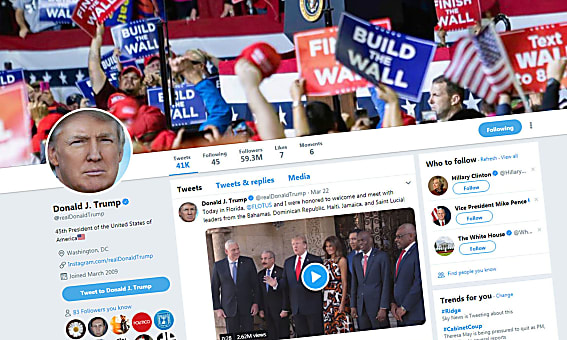
(Bloomberg) -- Appeals court judges were skeptical of Donald Trump’s bid to dismiss a lawsuit by Twitter users who were blocked from following the president, questioning his claim that the account is a personal platform separate from his role in the government.
In one exchange, Judge Barrington Parker asked Jennifer Utrecht, an attorney for the Justice Department, “Are you seriously urging us to believe that the president is not acting in his official capacity when he is tweeting?”
“I’m asking you to hold that he is not acting in his personal capacity when he’s blocking,” Utrecht replied.
The Knight First Amendment Institute at Columbia University sued Trump and White House Social Media Director Dan Scavino in 2017 on behalf of seven users who were blocked after they criticized the president and his policies. A federal judge in New York last year found that Trump’s account is a public forum and that blocking users violated their constitutional right to free speech.
On Tuesday, Utrecht urged a three-judge panel of the U.S. Court of Appeals in Manhattan to reverse that decision and throw out the suit, arguing that the account was established long before Trump became president and isn’t a public forum subject to free-speech protection.
“Donald Trump has had the ability to block anyone from his @realdonaldtrump account since long before his presidency,” Utrecht told the court. “This is not an authority that he is wielding by authority of his office.”
Judge Christopher F. Droney asked whether announcements made through Trump’s account, such as his recent comments on North Korean sanctions and his decision to pick Stephen Moore for an open seat on the board of the Federal Reserve, aren’t official actions that would make the account an arm of the federal government.
Utrecht said that while some of the tweets are official government statements, the president “does many things in his personal capacity.”
“When we’re talking about a personally owned account or a personally owned property such as, for example, Crawford Ranch or any of the other private residences that have been owned by the presidents during their presidencies, they still retain their private property rights separate and apart from their presidency,” Utrecht argued.
The lawsuit will help further define how officials and governments can use social media to communicate with the public as use of the networks become more widespread. While courts from California to Florida have mostly ruled that politicians can’t block critics on official accounts, the case is the first involving the president’s Twitter feed, which he has used for a decade for nearly-daily commentary on a wide range of issues. The appeals panel didn’t immediately rule on Trump’s request.
The Knight First Amendment Institute, which works to protect free speech, claims the users’ First Amendment rights were violated when they were blocked because it denied them the opportunity to participate in the discussion. Jameel Jaffer, an attorney for the institute, told the appeals court that public officials across the country are using social media to communicate with their constituents and that allowing them to block critics could have wide-ranging implications.
“If the court were to hold that this kind of blocking is beyond the reach of the First Amendment, that would have implications far beyond this particular context,” Jaffer said. “It would seemingly apply to the @POTUS and @WhiteHouse accounts as well. It would probably apply to every government website that has a space for public comment. I think you would be opening the door to manipulation and distortion of those spaces.”
(Updates with judges’ questioning starting in the third paragraph.)
To contact the reporter on this story: Chris Dolmetsch in Federal Court in Manhattan at cdolmetsch@bloomberg.net
To contact the editors responsible for this story: David Glovin at dglovin@bloomberg.net, Peter Jeffrey
For more articles like this, please visit us at bloomberg.com
©2019 Bloomberg L.P.